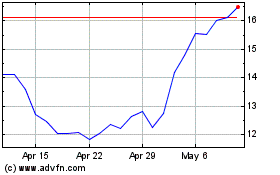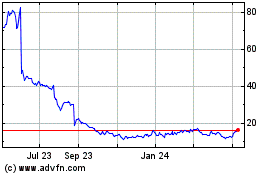The METIS trial demonstrated 21.9 months median time to
intracranial progression for patients treated with Tumor Treating
Fields and supportive care compared to 11.3 months for patients
treated with supportive care alone
Novocure to host investor conference call at 8 a.m.
EDT
Novocure (NASDAQ: NVCR) today announced the phase 3 METIS
clinical trial met its primary endpoint, demonstrating a
statistically significant improvement in time to intracranial
progression for adult patients treated with Tumor Treating Fields
(TTFields) therapy and supportive care compared to supportive care
alone in the treatment of patients with 1-10 brain metastases from
non-small cell lung cancer (NSCLC) following stereotactic
radiosurgery (SRS). Patients treated with TTFields therapy and
supportive care exhibited a median time to intracranial progression
of 21.9 months compared to 11.3 months in patients treated with
supportive care alone for brain metastasis (n=298; hazard
ratio=0.67; P=0.016). Median TTFields therapy treatment
duration was 16 weeks and median usage was 67%. Consistent with
previous studies, TTFields therapy was well-tolerated with
sustained quality of life and neurocognitive function. Baseline
characteristics were well balanced between arms.
“Patients with brain metastases from non-small cell lung cancer
are frequently treated with radiosurgery but face a high likelihood
of rapid brain relapse,” said Minesh Mehta, MD, Chief of Radiation
Oncology and Deputy Director at Miami Cancer Institute, part of
Baptist Health South Florida. “In this international, multicenter,
phase 3 trial, the use of TTFields therapy significantly delayed
time to brain relapse, with associated improvement in quality of
life and stable cognition. This is a major benefit and is
potentially practice changing.”
Preliminary analyses of key secondary endpoints (time to
neurocognitive failure, overall survival, and radiological response
rate) did not demonstrate statistical significance. Certain
secondary endpoints showed positive trends in favor of treatment
with TTFields therapy, including time to distant progression and
quality of life. Full analysis of secondary endpoints is
ongoing.
“Novocure’s willingness to pursue areas of considerable unmet
need, like the patient population studied in METIS, is a point of
pride for our company,” said Asaf Danziger, Novocure’s Chief
Executive Officer. “We are so pleased with the positive outcome of
this trial and encouraged by TTFields’ performance. I would like to
thank everyone involved with METIS, especially our courageous
patients and dedicated investigators, for their contributions to
the trial and for meaningfully contributing to the evolution of
treatment of brain metastases from NSCLC.”
Novocure intends to submit these data to regulatory authorities.
Novocure also intends to publish these findings in a peer-reviewed
scientific journal and share them at an upcoming scientific
congress.
Conference Call Details
Novocure will host a conference call and webcast to discuss the
METIS topline results at 8:00 a.m. EST today, March 27th. To access
the conference call by phone, use the following conference call
registration link and dial-in details will be provided. To access
the webcast, use the following webcast registration link.
The webcast and slides presented during the webcast can be
accessed live from the Investor Relations page of Novocure’s
website, www.novocure.com/investor-relations, and will be available
for at least 14 days following the call. Novocure has used, and
intends to continue to use, its investor relations website as a
means of disclosing material non-public information and for
complying with its disclosure obligations under Regulation FD.
About METIS
METIS [NCT02831959] is a phase 3 trial of stereotactic
radiosurgery with or without TTFields therapy for patients with
1-10 brain metastases from NSCLC. 298 adult patients were enrolled
in the trial and randomized to receive either TTFields therapy with
supportive care or supportive care alone following SRS. Supportive
care consisted of, but was not limited to, treatment with steroids,
anti-epileptic drugs, anticoagulants, pain control or nausea
control medications. Patients in both arms of the study were
eligible to receive systemic therapy for their NSCLC at the
discretion of their treating physician. Patients with known tumor
mutations for which targeted agents are available were excluded
from the trial.
The primary endpoint of the METIS trial is time to first
intracranial progression, as measured from the date of first SRS
treatment to intracranial progression or neurological death (per
RANO-BM criteria), whichever occurs first. Time to intracranial
progression was calculated according to the cumulative incident
function. Patient scans were evaluated by a blinded, independent
radiologic review committee. Secondary endpoints include, but are
not limited to, time to distant progression, time to neurocognitive
failure, overall survival, time to second intracranial progression,
quality of life and adverse events. Key secondary endpoints (time
to neurocognitive failure, overall survival, and radiological
response rate) were planned to be used in labeling claims, if
successful. Patients were stratified by the number of brain
metastases (1-4 or 5-10 metastases), prior systemic therapy, and
tumor histology. Patients were allowed to crossover to the
experimental TTFields therapy arm following confirmation of second
intracranial progression.
About Brain Metastases
Brain metastases are a secondary tumor formed when cancer cells
break away from the primary tumor and travel through the blood or
lymph system to form new tumors (or metastases) in the brain. Brain
metastasis are a negative prognostic factor in NSCLC and adversely
impact neurocognitive function and quality of life. Approximately
25% of patients with NSCLC have brain metastasis at diagnosis, and
lifetime risk among patients with NSCLC is approximately 50%.
Neurologic symptoms are present in approximately 60-75% of patients
with brain metastasis, and seizures, focal neurologic deficits,
headaches, and altered mental status are common. Treatment options
for patients with brain metastasis from NSCLC are limited to
neurosurgery, SRS, whole brain radiation therapy, or combinations
of these options. However, given the neurotoxicity and significant
decline in cognitive functioning, whole brain radiation therapy
(WBRT) is an unfavorable treatment option. New therapeutic options
are needed for greater intracranial control while minimizing the
risk of neurocognitive adverse events.
About Tumor Treating Fields Therapy
Tumor Treating Fields (TTFields) are electric fields that exert
physical forces to kill cancer cells via a variety of mechanisms.
TTFields do not significantly affect healthy cells because they
have different properties (including division rate, morphology, and
electrical properties) than cancer cells. The multiple, distinct
mechanisms of TTFields therapy work together to selectively target
and kill cancer cells. Due to its multimechanistic actions,
TTFields therapy can be added to cancer treatment modalities in
approved indications and demonstrates enhanced effects across solid
tumor types when used with chemotherapy, radiotherapy, immune
checkpoint inhibition, or PARP inhibition in preclinical models.
TTFields therapy provides clinical versatility that has the
potential to help address treatment challenges across a range of
solid tumors. To learn more about Tumor Treating Fields therapy and
its multifaceted effect on cancer cells, visit
tumortreatingfields.com.
About Novocure
Novocure is a global oncology company working to extend survival
in some of the most aggressive forms of cancer through the
development and commercialization of its innovative therapy, Tumor
Treating Fields. Novocure’s commercialized products are approved in
certain countries for the treatment of adult patients with
glioblastoma and malignant pleural mesothelioma. Novocure has
ongoing or completed clinical studies investigating Tumor Treating
Fields in brain metastases, gastric cancer, glioblastoma, liver
cancer, non-small cell lung cancer, pancreatic cancer and ovarian
cancer.
Headquartered in Root, Switzerland and with a growing global
footprint, Novocure has regional operating centers in Portsmouth,
New Hampshire and Tokyo, as well as a research center in Haifa,
Israel. For additional information about the company, please visit
Novocure.com and follow @Novocure on LinkedIn and Twitter.
Forward-Looking Statements
In addition to historical facts or statements of current
condition, this press release may contain forward-looking
statements. Forward-looking statements provide Novocure’s current
expectations or forecasts of future events. These may include
statements regarding anticipated scientific progress on its
research programs, clinical study progress, development of
potential products, interpretation of clinical results, prospects
for regulatory approval, manufacturing development and
capabilities, market prospects for its products, coverage,
collections from third-party payers and other statements regarding
matters that are not historical facts. You may identify some of
these forward-looking statements by the use of words in the
statements such as “anticipate,” “estimate,” “expect,” “project,”
“intend,” “plan,” “believe” or other words and terms of similar
meaning. Novocure’s performance and financial results could differ
materially from those reflected in these forward-looking statements
due to general financial, economic, environmental, regulatory and
political conditions and other more specific risks and
uncertainties facing Novocure such as those set forth in its Annual
Report on Form 10-K filed on February 22, 2024, and subsequent
filings with the U.S. Securities and Exchange Commission. Given
these risks and uncertainties, any or all of these forward-looking
statements may prove to be incorrect. Therefore, you should not
rely on any such factors or forward-looking statements.
Furthermore, Novocure does not intend to update publicly any
forward-looking statement, except as required by law. Any
forward-looking statements herein speak only as of the date hereof.
The Private Securities Litigation Reform Act of 1995 permits this
discussion.

View source
version on businesswire.com: https://www.businesswire.com/news/home/20240327203177/en/
Investors and Media:
Ingrid Goldberg
investorinfo@novocure.com
media@novocure.com
NovoCure (NASDAQ:NVCR)
Historical Stock Chart
From Mar 2024 to Apr 2024

NovoCure (NASDAQ:NVCR)
Historical Stock Chart
From Apr 2023 to Apr 2024
